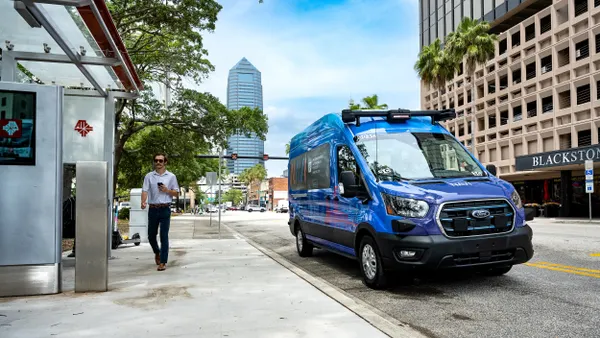Dive Brief:
- More than a year after shared scooters fleets were introduced to cities, the National Association of City Transportation Officials (NACTO) has released updated guidelines to manage shared micromobility fleets.
- To more nimbly regulate the industry and meet transportation goals, the guide recommends flexible permitting structures, including incentive-based performance clauses around issues like shifting trips or increasing options for underserved communities. The guide also says city streets should be redesigned "to fully realize the potential of shared micromobility" and give users a safe space to ride. That includes a recommendation that cities direct permit fees to infrastructure projects.
- The guidelines, developed by NACTO's steering committee of 81 cities and transit agencies, cover a range of issues, from safety concerns to operational requirements.
Dive Insight:
NACTO spokesman Alex Engel told Smart Cities Dive the guidelines reflected essentially a "full rewrite" to account for lessons learned by cities and transit agencies dealing with scooters in their own way.
A key section of the guide has to do with infrastructure. With the vehicle often too fast to go on sidewalks, but too slow to share space with cars, cities have had to grapple with where scooter and e-bike riders can go safely.
Protected bike lanes are expensive, and networks had not been designed with scooters in mind. To that end, NACTO recommends prioritizing the development of "safe and comfortable" bikeways and discuss potential street design changes.
Likewise, the guide explores parking options that can limit clutter, highlighting how Seattle, Orlando and Washington, DC have created designated parking areas.
Micromobility fleets offer a raft of data about where people are going and what type of trips they prefer, and NACTO builds on a previous guidance on best practices for the data. Cities, the guide says, should require trip data that will allow them to evaluate system performance, determine permit compliance and answer planning questions, while also requiring companies to comply with strict privacy standards.










